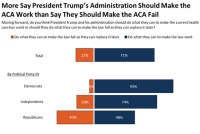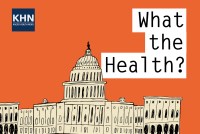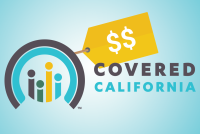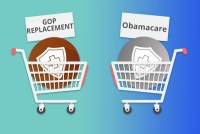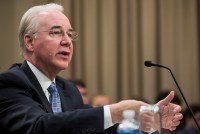Latest KFF Health News Stories
Facebook Live: Trump Ends Payments For Cost-Sharing Reductions. What’s Next?
In this Facebook Live chat, KHN’s Jay Hancock answers questions about President Donald Trump’s announcement that he will end federal payments for the Affordable Care Act’s cost-sharing reductions.
While Trump Moves To Dismantle Health Law, Public Favors Repair
Nearly three-quarters of Americans would like to see the administration focus on efforts on making the Affordable Care Act work, rather than trying to make it fail.
Podcast: ‘What The Health?’ Let’s Blow It Up
In this episode of “What the Health?” Julie Rovner of Kaiser Health News, Margot Sanger-Katz of The New York Times, Sarah Kliff of Vox and Julie Appleby of Kaiser Health News discuss the Trump administration’s latest efforts to undermine the individual insurance market.
California Slaps Surcharge On ACA Plans As Trump Remains Coy On Subsidies
Covered California authorized a 12.4 percent average surcharge on silver-tier plans, the second-least expensive option sold on the exchange. It brings the total average premium increase on those plans to nearly 25 percent next year.
Sen. Collins Announces Opposition To GOP Bill To Replace Obamacare
The statement from the Maine senator came after the Congressional Budget Office said the bill would cause millions of people to become uninsured.
Podcast: ‘What The Health?’ Why Is It So Difficult To Control Drug Prices?
In this episode of “What the Health?” Mary Agnes Carey of Kaiser Health News, Sarah Karlin-Smith of Politico, Margot Sanger-Katz of The New York Times and Julie Appleby of Kaiser Health News discuss the recent extension of cost-sharing subsidies for millions of low-income beneficiaries on the Affordable Care Act’s marketplaces and the state of play on Capitol Hill and in the states concerning initiatives to lower prescription drug costs.
Despite Insurers’ Tactical Win On ACA’s Cost-Sharing Payments, Uncertainty Lingers
Court allows state attorneys general to join a pending legal challenge to keep billions in subsidies flowing to consumers and insurers, despite the Trump administration’s resistance.
Covered California Expects 12.5% Average Rate Rise In 2018
The figure could be higher if President Trump ends an important consumer subsidy, which he has threatened to do. The exchange also announced that Anthem Blue Cross will pull out of Covered California and the overall individual market in 16 of the 19 regions it currently serves.
In Strong-Arm Tactic, Trump Puts Congressional Health Benefits Into Play
By taking aim at the subsidies received by some congressional staff members who, under the Affordable Care Act, are mandated to get their health coverage from the Obamacare exchanges, the president reignited an old fight.
‘Coverage Gap’ For Poor May End, But Many Will Still Have Trouble Affording Plans
Although some people below the poverty level will now be able to qualify for premium subsidies, they may have trouble covering the out-of-pocket costs.
Winners And Losers: 40 Is Old In Senate GOP Health Plan’s Subsidy Structure
The latest Republican plan to revamp the health law reshapes how age and income affect what help consumers get for paying premiums.
Capitol Hill Dems, HHS Secretary Price Trade Jabs On HHS Budget
Tom Price defends proposed spending reductions in Medicaid and other HHS programs while demurring on questions about cost-sharing subsidies for the 2018 Obamacare marketplace.
Feds To Waive Penalties For Some Who Signed Up Late For Medicare
People who were using marketplace plans instead of Medicare may qualify for the reprieve. They have until Sept. 30 to apply.
Why Blue States Might Ditch Beloved Obamacare Protections
With limited federal subsidies under the GOP health care bill, experts say states like California and New York would be under pressure to cut costs. That could mean shrinking benefits and dropping the prohibition against charging sicker patients higher premiums.
Running Short On Time, Covered California And Insurers Seek Obamacare Answers From GOP
Health insurers must submit initial rates to California’s exchange on Monday, but confusion persists over core elements of the current health law.
5 Things To Know About The Subsidies At The Heart Of A Capitol Hill Battle
Democrats want a bill to fund the government for the rest of the year to include funding for the health law’s cost-sharing reductions for low-income marketplace customers, but Republicans want to keep the issues separate.
Muerte por 1,000 recortes: cómo pueden los republicanos alterar su cobertura de salud
Los peores enemigos de la Ley de Cuidado de Salud Asequible ahora están a cargo. Y están discutiendo cambios que podrían afectar a una más amplia red de planes de empleadores y a la cobertura del Medicare para los adultos mayores.
Death By 1,000 Cuts: How Republicans Can Still Alter Your Coverage
There are many ways beyond legislative repeal for the Trump administration and congressional Republicans to unravel the Affordable Care Act.
The Next Obamacare Battleground: Subsidies For Out-Of-Pocket Costs
Exchange enrollees and insurers fret over a lawsuit that could end federal help with copays and deductibles.
La próxima batalla del Obamacare: subsidios para gastos de bolsillo
Los subsidios que ayudan a las personas con sus copagos y deducibles, distintos a los créditos impositivos para pagar las primas, están en medio de una batalla legal luego de una demanda republicana.




